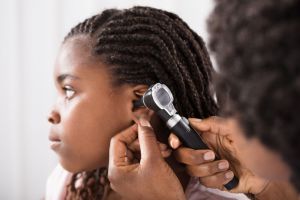Perhaps you child has failed a school hearing screening, or your teacher has raised some concerns about her hearing. Or maybe you’ve always wondered: Does my child have hearing loss?

If any of these scenarios sound familiar, don’t wait to act. Hearing loss has an enormous impact on childhood language development, and untreated hearing loss can also add to behavioral problems.
Since not all states mandate hearing screening in schools, an attentive teacher might have noticed a problem in the classroom that might indicate pediatric hearing loss. You might be thinking, “There is no way he has a hearing loss! If I say the word “dessert” from three rooms away he comes running!” But it is important to remember that just because a child appears to hear normally at home doesn’t mean he will necessarily be able to hear well in a noisy classroom environment with entirely different acoustics.
Some problems that teachers might look for are:
- Doesn’t seem to be paying attention.
- Looks to other children to imitate them.
- Doesn’t seem to follow or understand instructions.
- Asks, “What?” often.
- Gives unrelated answers to questions.
Talking to your child
No matter what the source of the concern, it is important to have the conversation with your child about hearing loss. The following questions are a good place to start:
- Do you feel like you have trouble hearing the TV sometimes?
- Do you feel like school is harder because sometimes you can’t hear the teacher?
- Do you feel like your teacher mumbles?
- Do you ever have pain in your ear, or a funny humming or buzzing sound?
- Do you have trouble understanding your friends, and often feel like you missed the joke?
Where to get help
If the hearing examiner or the teacher has indicated a possible problem, the next thing to do is find a hearing care professional in your area and make an appointment for a full hearing examination for your child. Remember your child may be nervous or apprehensive, so before the appointment it is important it is important to allay his fears and answer any questions he might have. Let him know that the test isn’t painful, and will simply involve putting on a pair of headphones and listening to some sounds. Talk to him about making sure to pay attention and follow the audiologist’s instructions closely. Also, you might have your child try on a pair of headphones before the appointment so he can get used to how they feel.
What to expect at the hearing test
The most common tests for kids are the pure tone hearing test and speech audiometry test. During the pure tone hearing test the child wears headphones, and is asked to respond to sounds by raising a finger, pressing a button or pointing to the ear that heard the sound. The test determines the faintest tones a child can hear at a range of frequencies. A speech audiometry test records the faintest speech that can be heard 50 percent of the time, and can also include word recognition.
In rare cases, some pain-free tests of the middle ear might need to be performed. Measuring the acoustic reflex, measuring the volume of air in the ear canal or simply using air pressure can determine whether there is fluid in the middle ear, eardrum perforation or wax in the ear canal. These tests can also measure mobility of the eardrum to determine whether it is too stiff, moves too much or has a perforation. Lastly, they can help determine location of the problem as well as determine the type of hearing loss. It’s also important to know that children’s hearing can be impacted if they have an ear infection.
Auditory processing disorder
If your child passes their hearing exam, but you or your child still feel like they have trouble hearing—or maybe even understanding spoken words—it could be something known as auditory processing disorder.
Where to go from here
The results of the testing will not only help the hearing care professional determine whether there is hearing loss, but the degree of hearing loss as well. If there is hearing loss, it is important to know to what extent learning, communication and social skills will be affected. Afterward, the hearing care professional will recommend a course of treatment which may include hearing aids and/or assistive devices. In some cases, a cochlear implant or bone-anchored hearing system might be recommended, as well as referrals to other professionals that might help. Some of these include speech-language pathologists, medical professionals or educational interventionists, especially if auditory processing disorder is suspected.
Remember, untreated hearing loss in children can affect everything from social interactions to emotional development to learning. So if you or your child’s teacher suspects a hearing loss, be sure to get it checked out right away by a hearing care professional.
